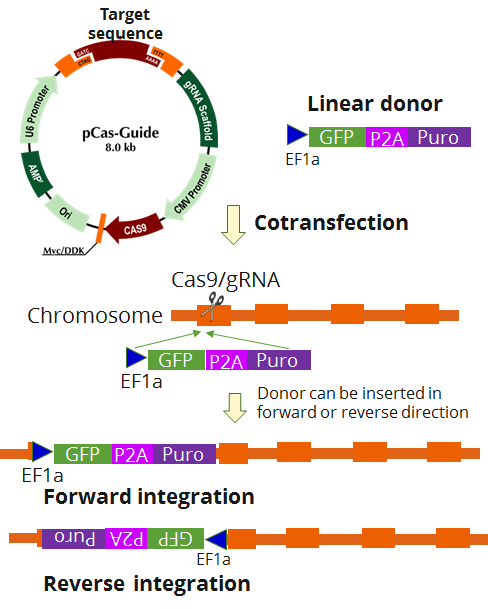TAF1 Human Gene Knockout Kit (CRISPR)
CAT#: KN416684
TAF1 - KN2.0, Human gene knockout kit via CRISPR, non-homology mediated.
KN2.0 knockout kit validation
KN416684 is the updated version of KN216684.
USD 1,290.00
2 Weeks*
Size
Other products for "TAF1"
Specifications
| Product Data | |
| Format | 2 gRNA vectors, 1 linear donor |
| Donor DNA | EF1a-GFP-P2A-Puro |
| Symbol | TAF1 |
| Locus ID | 6872 |
| Disclaimer | The kit is designed based on the best knowledge of CRISPR technology. The system has been functionally validated for knocking-in the cassette downstream the native promoter. The efficiency of the knock-out varies due to the nature of the biology and the complexity of the experimental process. |
| Reference Data | |
| RefSeq | NM_001286074, NM_004606, NM_138923, NR_104387, NR_104388, NR_104389, NR_104390, NR_104391, NR_104392, NR_104393, NR_104394, NR_104395, NR_104396 |
| Synonyms | BA2R; CCG1; CCGS; DYT3; DYT3/TAF1; KAT4; MRXS33; N-TAF1; NSCL2; OF; P250; TAF(II)250; TAF2A |
| Summary | 'Initiation of transcription by RNA polymerase II requires the activities of more than 70 polypeptides. The protein that coordinates these activities is the basal transcription factor TFIID, which binds to the core promoter to position the polymerase properly, serves as the scaffold for assembly of the remainder of the transcription complex, and acts as a channel for regulatory signals. TFIID is composed of the TATA-binding protein (TBP) and a group of evolutionarily conserved proteins known as TBP-associated factors or TAFs. TAFs may participate in basal transcription, serve as coactivators, function in promoter recognition or modify general transcription factors (GTFs) to facilitate complex assembly and transcription initiation. This gene encodes the largest subunit of TFIID. This subunit binds to core promoter sequences encompassing the transcription start site. It also binds to activators and other transcriptional regulators, and these interactions affect the rate of transcription initiation. This subunit contains two independent protein kinase domains at the N- and C-terminals, but also possesses acetyltransferase activity and can act as a ubiquitin-activating/conjugating enzyme. Mutations in this gene result in Dystonia 3, torsion, X-linked, a dystonia-parkinsonism disorder. Alternative splicing of this gene results in multiple transcript variants. This gene is part of a complex transcription unit (TAF1/DYT3), wherein some transcript variants share exons with TAF1 as well as additional downstream DYT3 exons. [provided by RefSeq, Oct 2013]' |
Documents
| Product Manuals |
| FAQs |
Resources
Other Versions
| SKU | Description | Size | Price |
|---|---|---|---|
| GA104731 | TAF1 CRISPRa kit - CRISPR gene activation of human TATA-box binding protein associated factor 1 |
USD 1,290.00 |
{0} Product Review(s)
0 Product Review(s)
Submit review
Be the first one to submit a review
Product Citations
*Delivery time may vary from web posted schedule. Occasional delays may occur due to unforeseen
complexities in the preparation of your product. International customers may expect an additional 1-2 weeks
in shipping.






























































































































































































































































 Germany
Germany
 Japan
Japan
 United Kingdom
United Kingdom
 China
China

